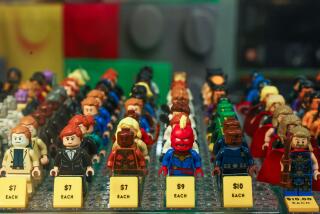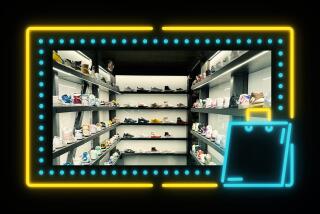Hobby shop is an old curiosity
- Share via
Before there were video games or the Internet, local children would rush into Greg Kelly’s little hobby shop to check out the latest model train or sailboat. They would follow Kelly outside, where the hobbyist would fly a hand-held balsa wood airplane -- usually propelled by nothing more than a tightly wound rubber band.
“They just loved that,” Kelly recalled. “Then if they had a dollar or two dollars on them, they’d buy it.”
Three decades later, Kelly’s Hobby Shop operates in much the same way it did in the ‘70s: no website or e-mail address, no credit cards, no fancy advertising.
And although many hobby shops update their merchandise to stay on top of trends, Kelly is content to run his store as he always has, stocked with scale models and figurines, rockets, paints and other supplies. The Old Town Tustin store is so crammed with old-fashioned toys that there is barely any counter space left.
“My thing is the hobbies,” said Kelly, 55. “I don’t care about upgrading or the world of machines.”
Although the inventory and the owner have stayed the same since the store opened in 1972, the customers haven’t, Kelly said. Once young and sprightly, his customers today are mainly in their 50s or older and are old-school hobbyists who appreciate Kelly’s loyalty to more traditional fare.
The children, Kelly said, have largely lost interest, opting instead for modern playthings such as video games and ready-made toys. These days, they primarily come into his store as part of a Boy Scout task or for a school project.
“Kids today aren’t interested,” he said. “They want to put the batteries in and go.”
Business is steady but slow -- the peak years were in the early 1980s, Kelly said, when a greater interest in hobbying drew large numbers of customers to Kelly’s Hobby Shop. The store is still profitable and has annual revenue of about $150,000, he said.
Kelly opened his shop at the age of 20 after his parents bought the building and opened their own store, Kelly’s Cards and Gifts, next to his. He prefers to run Kelly’s Hobby Shop by himself, seven hours a day, six days a week. To advertise his business, he relies on word of mouth and prints fliers, which he personally delivers door to door.
Jacob Fletcher, a fourth-grader at Red Hill Elementary in Santa Ana, is one of the few children who still regularly stops by Kelly’s Hobby Shop. The 10-year-old enjoys building Star Wars and Star Trek kits and boasts that his parents rarely help him with his projects.
“It takes a long time to build things, but I still like to do it,” he said. “It’s worth it.”
Among his friends, Jacob is on his own when it comes to building the intricate models. Although his buddies are impressed by his handiwork, they don’t have a desire to take up hobbying themselves, said his mother, Tammie Fletcher.
“I think putting together models is sort of like a lost art,” Fletcher, 41, said. “A lot of the kids these days don’t have the patience to do it.”
Fletcher, a nonprofit association manager from Tustin, said she was grateful to Kelly and his shop for providing Jacob with projects that teach him to “commit to a task and see it all the way through.”
“I think it’s something all parents should encourage,” she said. “We forget that some of the best toys don’t require batteries.”
Many hobby shops are seeing fewer young customers, said Don Hendrick, president of the National Retail Hobby Stores Assn., based in Wheaton, Ill.
“Our traditional base of customers is definitely aging,” Hendrick said. “Ten, 20 years ago, there was no Nintendo; there was no iPod; there were no computer games. You either went to a toy store or you went to a hobby shop.
“Now, there’s so much electrical stuff that’s vying for a kid’s attention. Part of the challenge facing our industry is making the youths aware of the tremendously exciting stuff we have.”
The number of retail hobby shops is “definitely getting smaller” as online retailers flourish, Hendrick said. Many remaining stores have reached out to youngsters by carrying items that require little or no assembly as well as merchandise not traditionally associated with hobby shops, such as skateboards.
“Just like any other business, you have to adapt to what your customers are looking for,” he said.
To appeal to younger customers, Kelly carries a few Harry Potter and Jurassic Park items as well as a large selection of model rockets that can blast as high as 2,600 feet in the air -- a hit among kids. He occasionally holds model-building workshops in the store and is still happy to demonstrate his antique toys, such as a miniature race car propelled by a mousetrap.
But for the most part, he has resisted the many changes he sees in other hobby shops. Customers won’t find radio-controlled items, “Magic: The Gathering” cards or video games here, and Kelly is proud of that.
Through his devotion to old-fashioned toys, Kelly has developed a small but faithful following.
“It’s the last of the breed,” said Chuck Herrington, 68, a Santa Ana retiree who has been a customer at Kelly’s for 15 years. “It’s an old-fashioned hobby shop and it’s a personalized owner. . . . He actually does hobbies. He’s not there to make money.”
With no formal training, Kelly spends weeks -- even months -- working on his original creations, many of which are displayed around his store. He rarely works from a kit, instead choosing to find a photo or drawing of an architecturally compelling building and creating a design from that. His replica of Shakespeare’s Globe Theatre took four months to complete. He says his next project may be a three-dimensional parody of Grant Wood’s iconic painting “American Gothic.”
“Running a business is fairly simple,” he said, “but building a model takes a little more of your imagination.”
Kelly acknowledges that many people appreciate the models but not the work that goes into them, so he makes his expertise available by assembling customers’ kits for a fee and selling his custom-made creations.
The store, he said, “means everything to me,” and he intends to keep running it the way he likes, even if it means fewer customers.
“You can’t be all things to all people,” Kelly said. “I just keep it simple.”
More to Read
Inside the business of entertainment
The Wide Shot brings you news, analysis and insights on everything from streaming wars to production — and what it all means for the future.
You may occasionally receive promotional content from the Los Angeles Times.










